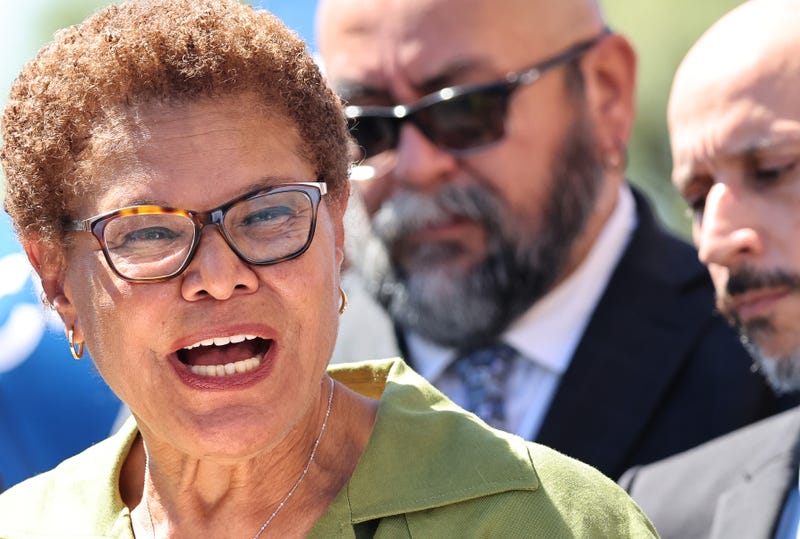
City officials are moving forward Tuesday with a review of potential improvements to the Los Angeles Police Department's mental health response team following a performance audit that found officers were addressing crisis calls with a patrol-first, armed approach and failed to meet certain goals.
Want to get caught up on what's happening in SoCal every weekday afternoon? Click to follow The L.A. Local wherever you get podcasts.
City Controller Kenneth Mejia released an assessment Monday of the LAPD's Mental Evaluation Unit, whose primary role is to respond to calls for service that may involve mental health crises. The assessment came in response to the January 2023 killings of three men in apparent mental health crisis, and focused on operations and incident data from 2020-22, as well as use of force incidents between 2021-24.
Mejia's team examined the MEU's Systemwide Mental Assessment Response Team -- co-response teams of armed LAPD officers alongside L.A. County Department of Mental Health clinicians that address mental health-related service calls. The SMART units are a secondary support unit behind patrol units.
The assessment evaluated LAPD policies and training protocols.
"Currently, the primary response that exists for mental health emergencies is the LAPD's Mental Evaluation Unit's SMART teams. MEU's own stated mission is to prevent unnecessary incarceration and hospitalization and reduce violence -- however, my office's assessment of LAPD MEU found that LAPD does little to prove MEU or SMART accomplish any of this," Mejia said in a statement.
He noted that LAPD officers who respond to mental health crises are still armed and receive basic training that is available to all LAPD personnel.
"Most concerning is that while LAPD's directive requires SMART to be deployed to mental health calls involving people who may be violent or armed, or are high-risk, or otherwise involved in a critical incident -- LAPD doesn't allow SMART units' officers or mental health clinicians to be primary responders in these or lower risk or non-violent situations," Mejia said.
"In fact, LAPD requires armed patrol units to be primary responders," he added.
The controller recommended that the police department revise its policy to allow SMART teams to lead responses in mental health-related calls that don't involve weapons. He further urged the City Council and Mayor Karen Bass to support and expand the Unarmed Model of Crisis Response pilot program.
Additionally, he recommended that L.A. County and the city should reevaluate mental health clinicians' role in mental health-related 911 responses to make better use of their clinical skills.
The MEU is a nearly $13 million annual investment for payroll of about 80 officers, according to the Controller's Office.
"With this report, the LA community, stakeholders and the LAPD will gain better insight into whether the city's multi-million dollar yearly investment in MEU is meeting its intended goals," Mejia said in his statement.
The full report can be found at bit.ly/lapdmeu.
Other main findings of the assessment included the following:
-- The LAPD's policies for use-of-force are vague;
-- The LAPD lacks clear parameters for engaging with people in mental crisis;
-- performance is measured by one area in how quickly SMART personnel relieves patrol officers from on-scene duties; and
-- SMART personnel focus on carrying out 5150 hold applications, also known as involuntary 72-hour mental health detentions.
Bass thanked the Controller's Office for the assessment, saying it will aid in informing policy decisions.
"These units have a vital role to play, and I will be working with the controller and LAPD Chief (Jim) McDonnell on reviewing these recommendations closely, including additional training and appropriately updating policies to ensure that SMART units are fully maximized to assist Angelenos in mental health crises and to help prevent excessive use of force,"
Bass said in a statement. "At the same time, we will take stock of additional needs, like building out a robust mental health clinician workforce in the region."
Bass, a former health care professional, said she knows what can happen when people go without mental health treatment.
"This is not fair to the individuals who need care nor to the officers who are not equipped to respond to individuals in crisis. We must do better, and information presented in this report can help us to move the needle toward that goal," Bass said in her statement.
She touted the city's investments into civilian crises response models such as Crisis and Incident Response Through Community-Led Engagement, as well as Unarmed Model of Crisis Response. Those initiatives have resulted in nearly 25,000 mental health crisis being resolved by civilian responders in the last fiscal year, officials said.
Councilwoman Nithya Raman, chair of the Housing and Homelessness Committee, said the report underscores the need for a "true city-wide unarmed response program" where more mental health calls are handled by trained clinicians and social workers.
Councilwoman Eunisses Hernandez, co-chair of the Ad Hoc Committee on Unarmed Crisis Prevention, Intervention and Community Services, supported Mejia's recommendations.
"Since 2021, anywhere from 35% to 41% of LAPD shootings involve people in crisis, which lead to significant harm, death and liability costs," Hernandez said. "Our public safety ecosystem has teams that are specifically trained to handle mental, behavior and emotional health crises, and it is our duty to expand these city-wide."
Follow KNX News 97.1 FM
